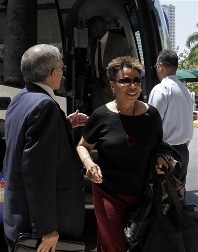
|  |  |  Americas & Beyond | April 2009 Americas & Beyond | April 2009  
US Lawmakers Meet Castros, Urge End to Embargo
 Associated Press Associated Press
go to original


| | U.S Rep. Barbara Lee, D-Calif, arrives at her hotel in Havana, Friday, April 3, 2009. US lawmakers traveled to Cuba on Friday in another sign of the US Congress' apparent interest in easing a long-standing trade embargo and travel restrictions. (Associated Press) |  |
As the Obama administration considers a shift in the half-century policy of isolating Cuba, members of the Congressional Black Caucus returned from Havana saying the Castro brothers are eager to see a new day in U.S.-Cuban relations.

Rep. Laura Richardson, D-Calif., one of three lawmakers to meet Fidel Castro on Tuesday, said she got the sense that "he really wants President Obama to succeed" in his foreign policy goals. "He sincerely wants an opportunity, I think, in his lifetime to see a change in America."

Richardson was joined by Reps. Barbara Lee, D-Calif., head of the 42-member Congressional Black Caucus, and Bobby Rush, D-Ill., in meeting the 82-year-old Fidel Castro for nearly two hours in his home before the delegation returned to Washington.

On Monday evening, six members of the group talked for four hours with Raul Castro, who replaced his ailing brother as Cuba's president 14 months ago. It was Raul Castro's first encounter with U.S. officials since formally replacing his brother as head of state.

Raul, according to Lee, "said everything was on the table" in reopening the dialogue with the United States that was effectively shut off after Fidel Castro gained control of the island in 1959 and imposed communist rule.

The visit by the Congressional Black Caucus, which has long championed an end to the trade and travel embargoes imposed on Cuba, coincided with increased movement both in Congress and by President Barack Obama to ease some of the restrictions on economic and social contacts with Cuba.

Obama has already taken steps to remove limits on how often Cuban-Americans can visit relatives on the island and how much money they can send to family members, and lawmakers in both the House and the Senate recently introduced legislation to end the ban on almost all travel by Americans to Cuba. Democrats and Republicans from farm states are pushing for an end to restrictions that have hampered sales of farm products to Cuba.

Jeffrey Davidow, the White House adviser for the Summit of the Americas to be held in Trinidad and Tobago April 17-19, said Monday he "would not be surprised" if the president announces more changes in U.S. policies before that meeting.

"For the past 50 years, the United States has been swimming in the Caribbean Sea of delusion" by believing that embargoes could bring about the downfall of Castro, said Rep. Emanuel Cleaver, D-Mo., at a news conference after the group returned to Washington. After half a century, he said, "we are the only nation that is isolated."

But there's little suggestion that the administration is ready to commit to ending the trade embargo and there's still fierce opposition in Congress, led by Cuban-American lawmakers, to even incremental easing of restrictions while the Castros remain in power.

Sen. Robert Menendez, D-N.J., the son of Cuban immigrants and head of the Democratic Senatorial Campaign Committee, has promised to fight any loosening of restrictions.

"Our great nation should always stand for human freedom and democracy and against underwriting regimes that oppress, suppress and murder," he said last week after fellow senators introduced legislation that would end the travel ban.

The three House lawmakers were the first U.S. officials to sit down with Fidel Castro since he had emergency intestinal surgery in July 2006.

Lee said that he was "very healthy, very energetic, very clear-thinking," and that he had followed closely the U.S. election and Obama's promises to forge a more open and multilateral foreign policy.

Castro "looked directly into our eyes" and asked, "How can we help President Obama?" Richardson said.

Rush, the third participant in the meeting with Fidel Castro, said his impression was that Cubans "want to have the kind of relationship they had prior to the blockade. They deserve that." |

 |
|  |



